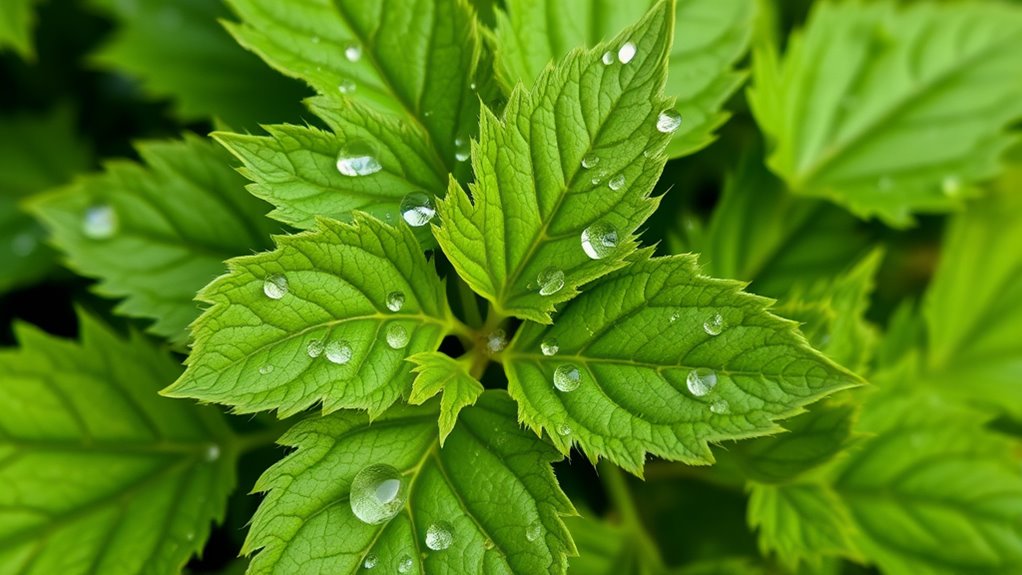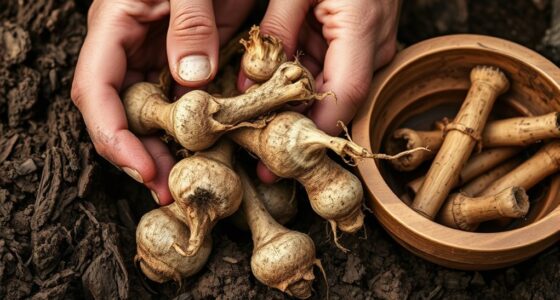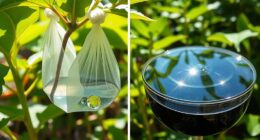Stinging nettle is a highly nutritious plant packed with vitamins like C and B complex, minerals such as calcium, iron, magnesium, and potassium, and antioxidants like flavonoids and carotenoids. It offers fiber, low calories, and a good protein source, supporting immune health, bone strength, and digestion. Cooking methods can affect its nutrient content, but proper preparation preserves most benefits. Explore further to discover how this versatile green can enhance your diet.
Key Takeaways
- Rich in vitamins like vitamin C and B complex, supporting immune health and energy production.
- High mineral content, including calcium (430 mg/100g) and iron (4.1 mg/100g), essential for bones and blood.
- Contains dietary fiber, antioxidants, and low calories, promoting digestion and overall health.
- Nutrients are best preserved through quick steaming, blanching, or freezing after harvest.
- Offers a nutrient-dense profile with antioxidants, supporting anti-inflammatory and free radical scavenging benefits.
Vitamins in Stinging Nettle
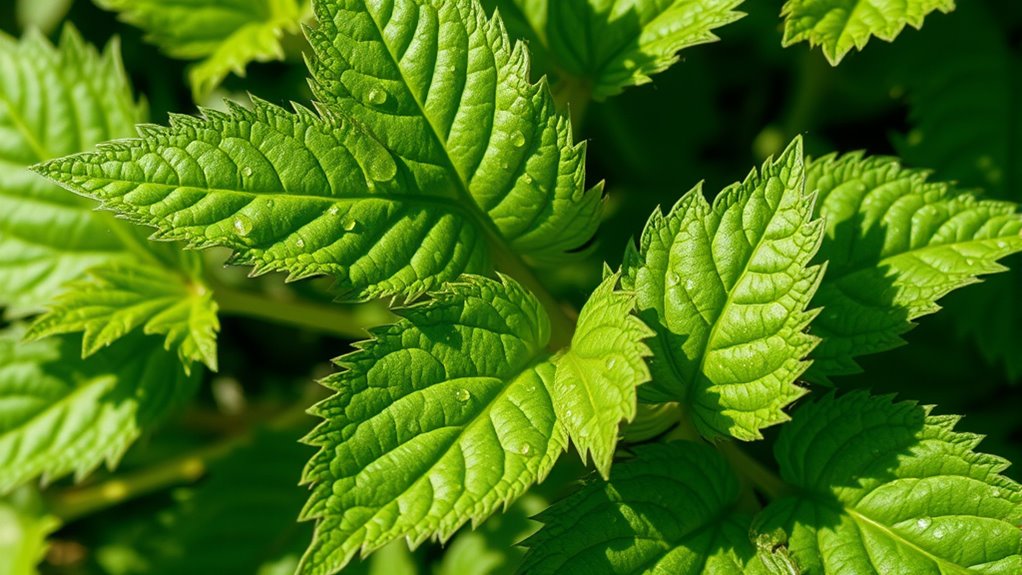
Stinging nettle is rich in essential vitamins that support your overall health. Among these, vitamin C stands out for its immune-boosting benefits, helping your body fight off illnesses and promoting healthy skin. It also acts as an antioxidant, protecting your cells from damage. B complex vitamins play fundamental roles in energy production, brain function, and red blood cell formation. Nettle provides a good source of these vitamins, ensuring your nervous system stays strong and your metabolism runs smoothly. By including nettle in your diet, you benefit from a natural boost of essential nutrients that help maintain your body’s balance. These vitamins work together to support your well-being, making nettle a valuable addition to a nutritious diet. Additionally, the presence of nutritional benefits in nettle underscores its value as a healthful, natural supplement.
Minerals Found in Nettle
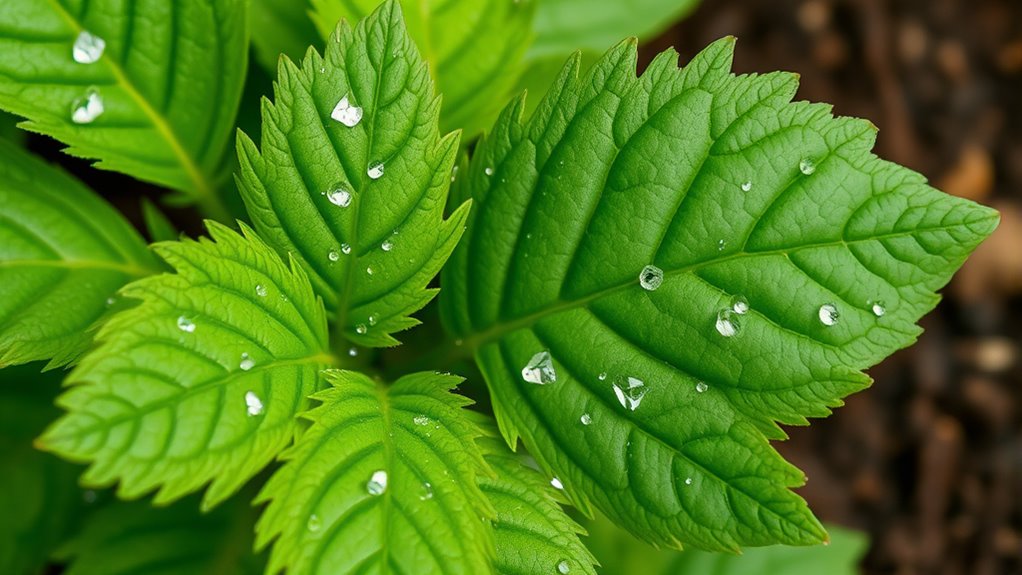
Nettle offers a rich mineral spectrum that can boost your health. You’ll find high levels of calcium and iron, essential for strong bones and blood health. Additionally, magnesium and potassium support muscle function and overall balance in your body. Some varieties of nettle are also used in herbal medicine for their therapeutic benefits.
Rich Mineral Spectrum
Because of its dense mineral content, nettle is considered a nutritional powerhouse. Its rich mineral spectrum results from ideal soil mineralization, which enhances the plant’s mineral uptake. This means the minerals in nettle are highly bioavailable, making them easier for your body to absorb and utilize. Nettle contains a wide variety of essential minerals, including magnesium, potassium, and trace elements crucial for your health. These minerals support numerous bodily functions, from nerve transmission to muscle function and enzyme activity. The plant’s ability to concentrate minerals depends on soil quality and mineralization processes, ensuring you get a potent source of necessary nutrients. Consuming nettle regularly can help you meet your mineral needs naturally, thanks to its impressive mineral spectrum and high plant bioavailability. Additionally, understanding the history of plant use in traditional medicine can provide insights into its longstanding health benefits.
Calcium and Iron Levels
Calcium and iron are two essential minerals that nettle provides in significant amounts, supporting your bone health and preventing deficiencies. The high calcium content offers medicinal benefits like strengthening bones and teeth, making it a valuable addition to your diet. Iron, on the other hand, boosts your energy and immune function, helping combat fatigue and anemia. Nettle’s mineral profile makes it versatile for culinary uses, from teas to soups, enhancing nutrient intake naturally. The table below highlights the key minerals found in nettle:
| Mineral | Quantity per 100g | Key Benefits |
|---|---|---|
| Calcium | 430 mg | Bone strength, teeth health |
| Iron | 4.1 mg | Energy, blood health |
| Magnesium | 60 mg | Muscle function, recovery |
Incorporating nettle enriches your diet with essential minerals and promotes overall wellness.
Magnesium and Potassium Content
Have you ever wondered how nettle supports your muscle function and electrolyte balance? Its high magnesium and potassium content play a crucial role in maintaining healthy nerve and muscle activity. Magnesium helps regulate blood pressure and supports relaxation, making it beneficial during meditation practices that require focus and calm. Potassium aids in balancing fluids and preventing cramps. When nettle is sourced from sustainable farming, you get a pure, nutrient-rich plant. Including nettle in your diet can help replenish these essential minerals naturally. This not only boosts your overall well-being but also aligns with eco-friendly practices. By choosing sustainably farmed nettle, you ensure you’re supporting both your health and the planet while benefiting from its impressive mineral profile.
Antioxidant Content of the Plant
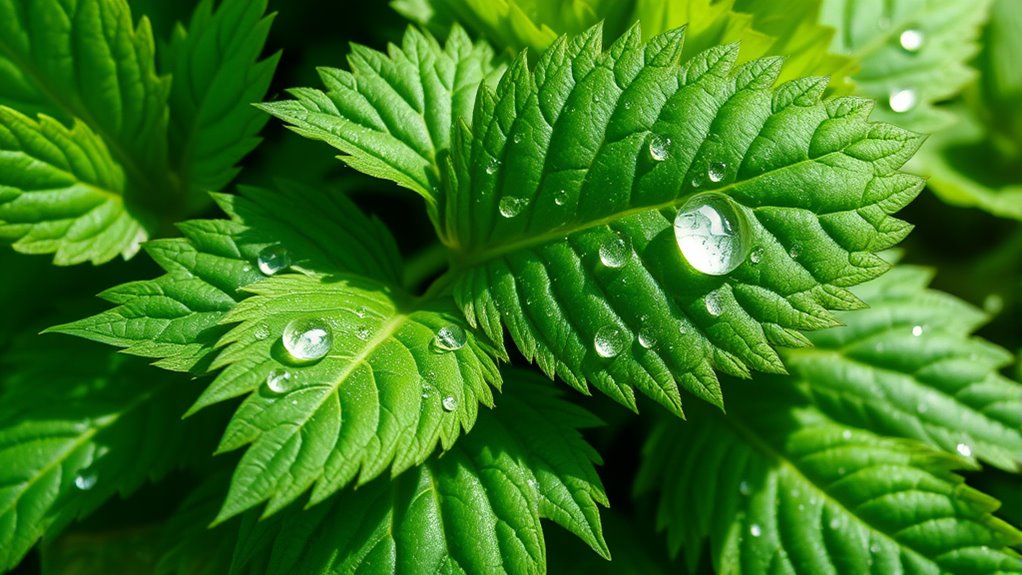
Stinging nettle is rich in antioxidants, which help protect your cells from damage caused by free radicals. Its high antioxidant capacity means it can effectively neutralize harmful molecules, reducing oxidative stress. The plant contains compounds like flavonoids, carotenoids, and vitamin C, all known for their free radical scavenging abilities. These antioxidants contribute to the plant’s health benefits, supporting your immune system and potentially lowering inflammation. Regularly consuming stinging nettle can boost your body’s defenses against oxidative damage, promoting overall wellness. Its potent antioxidant content makes it a valuable addition to a balanced diet, especially if you’re seeking natural ways to combat oxidative stress. Additionally, credit card security measures are crucial in protecting personal health information when purchasing supplements online. Overall, the antioxidant properties of stinging nettle highlight its importance as a nutrient-rich, health-promoting plant.
Macronutrient Composition
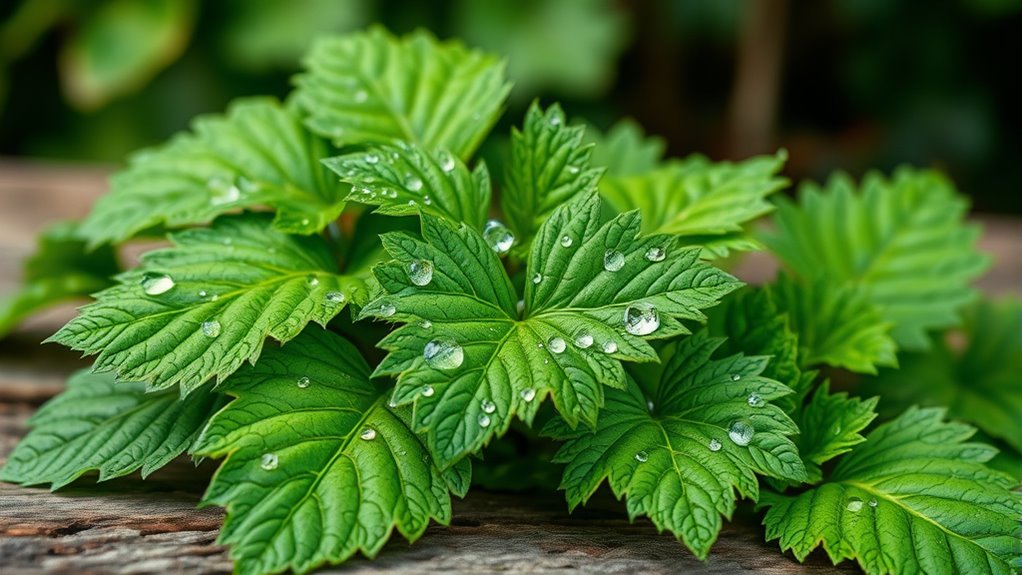
While often celebrated for its micronutrients, stinging nettle also boasts a notable macronutrient profile that supports your overall health. It contains a modest amount of carbohydrates, primarily complex carbs, which provide sustained energy. Nettle is also a good source of fiber benefits, aiding digestion and promoting gut health. Its protein content, while not high, includes valuable sources for plant-based diets, making it a useful addition to your meals. Additionally, understanding cost and budgeting considerations can help you incorporate nettle into your diet affordably. Here’s a quick snapshot of its macronutrient composition:
| Macronutrient | Amount per 100g | Benefits |
|---|---|---|
| Carbohydrates | 7 grams | Energy, fiber benefits |
| Protein | 2.5 grams | Supports muscle repair |
| Fats | 0.5 grams | Healthy fats, essential functions |
Protein Levels and Benefits
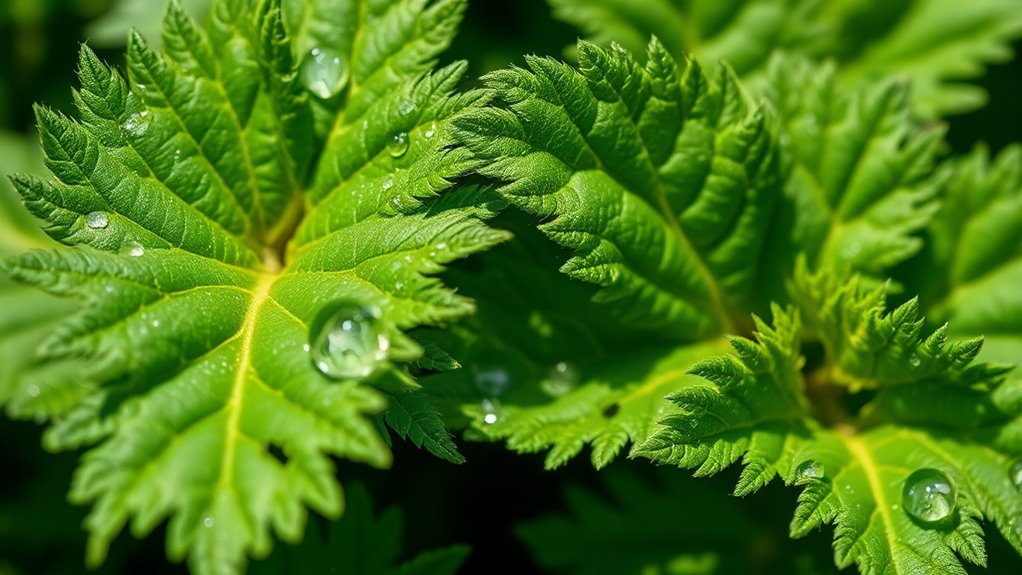
Although nettle’s carbohydrate and fiber content support energy and digestion, its protein levels also play a significant role in your diet. Nettle boasts a notable protein content, rich in essential amino acids that your body needs for repair and growth. Its amino acid profile makes it a valuable plant-based source of complete protein, especially for vegetarians and vegans. Incorporating nettle can help boost muscle maintenance and overall immune function. Additionally, the high-quality protein aids in enzyme production and hormone synthesis. By including nettle in your meals, you ensure a diverse intake of amino acids that complement other protein sources. Its balanced amino acid profile makes it a versatile and nutritious addition for supporting your daily protein needs. The protein content of nettle also contributes to its reputation as a nutritious leafy green.
Dietary Fiber and Digestive Health
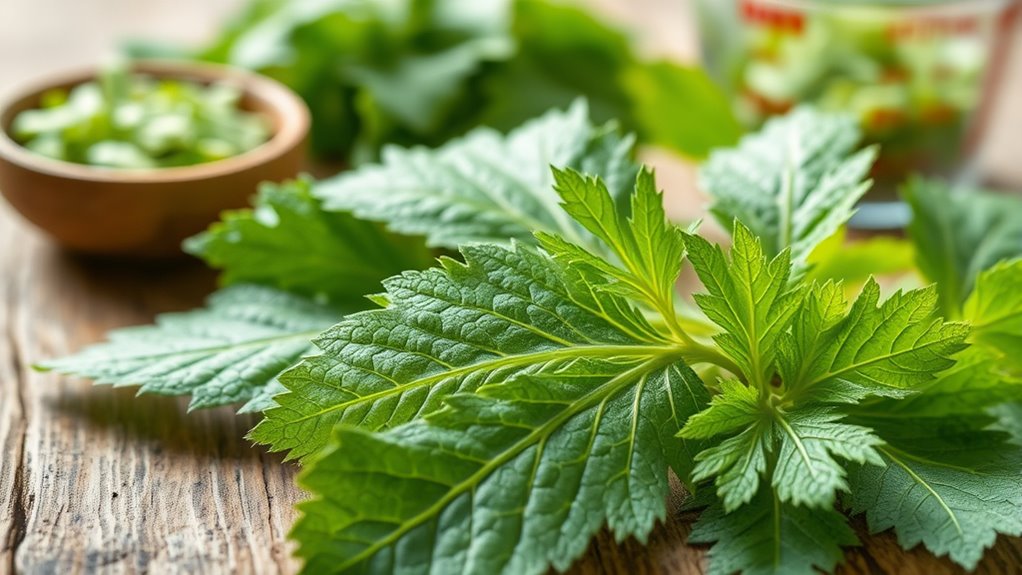
Nettle is rich in dietary fiber, which plays a crucial role in maintaining healthy digestion. The fiber benefits you get from consuming nettle help regulate your bowel movements and prevent constipation. When you include nettle in your diet, you support digestion improvement by adding bulk to your stool, making it easier to pass through your digestive system. Fiber also promotes a healthy gut environment by feeding beneficial bacteria, which further enhances digestion. Plus, fiber helps in controlling blood sugar levels and lowering cholesterol, contributing to overall digestive health. Incorporating nettle into your meals can also be a budget-friendly way to boost your fiber intake without straining your finances. This natural approach supports your long-term gut health and well-being.
Phytochemicals and Their Roles
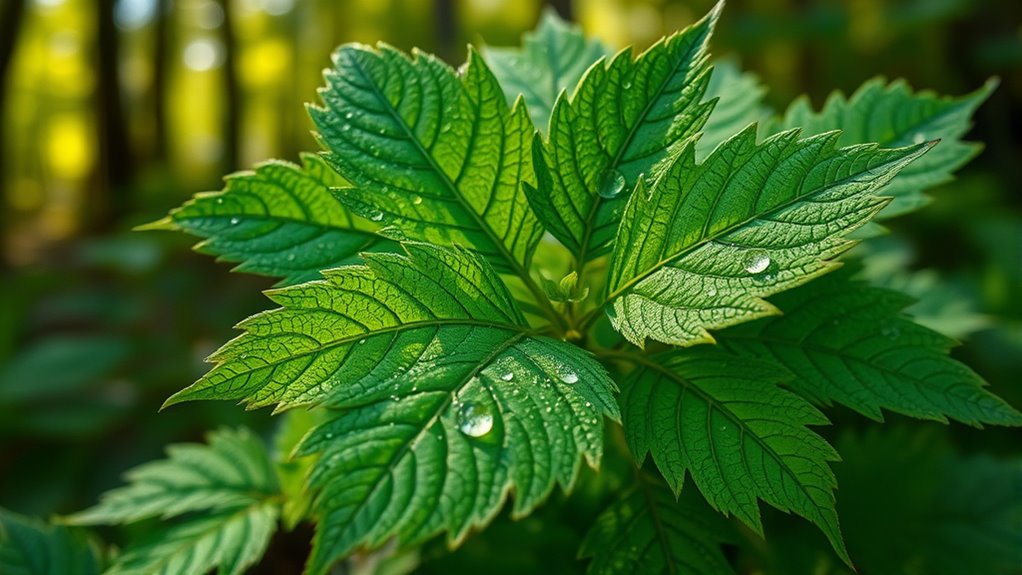
Nettle’s dietary fiber supports digestion, but its health benefits extend far beyond that. Its rich array of phytochemicals, including flavonoid antioxidants and phenolic compounds, plays a vital role in promoting well-being. These compounds help neutralize free radicals, reducing oxidative stress and lowering the risk of chronic diseases. Flavonoids also support your immune system and improve circulation. Phenolic compounds contribute anti-inflammatory properties, easing discomfort and supporting tissue health. By consuming nettle, you’re gaining powerful bioactive substances that work synergistically to protect your cells and enhance overall health. Recognizing these phytochemicals emphasizes the plant’s potential as a natural health booster. Incorporating nettle into your diet can provide these benefits naturally, supporting your body’s defenses and promoting longevity. phytochemicals play a crucial role in the plant’s health-promoting effects.
Caloric Value and Energy Contribution
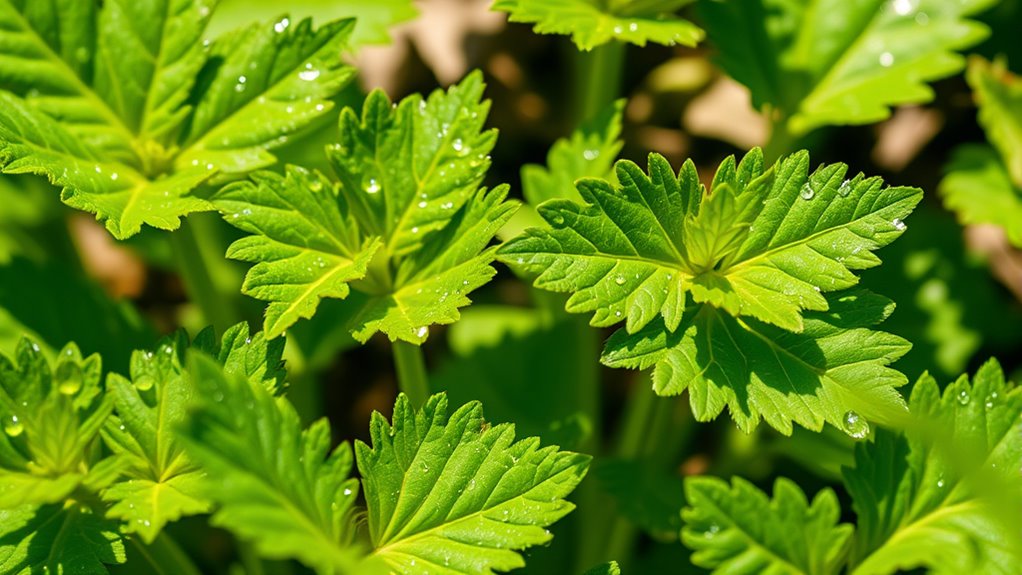
Since it is low in calories, stinging nettle can be a valuable addition to a weight-conscious diet. Its caloric density is minimal, providing only about 42 calories per 100 grams, making it an excellent source of nutrition without excess energy. The plant’s energy contribution mainly comes from its rich content of fiber, vitamins, and minerals, which support overall health and vitality. Because of its light caloric load, you can incorporate nettle into meals like soups, teas, or salads without substantially increasing your daily caloric intake. This makes it suitable for those seeking nutrient-dense foods that offer sustained energy without weight gain. Additionally, understanding caloric value helps you make informed dietary choices to meet your health goals. Overall, stinging nettle delivers a boost of nutrients with a negligible impact on your caloric budget.
Comparing Nettle to Other Leafy Greens
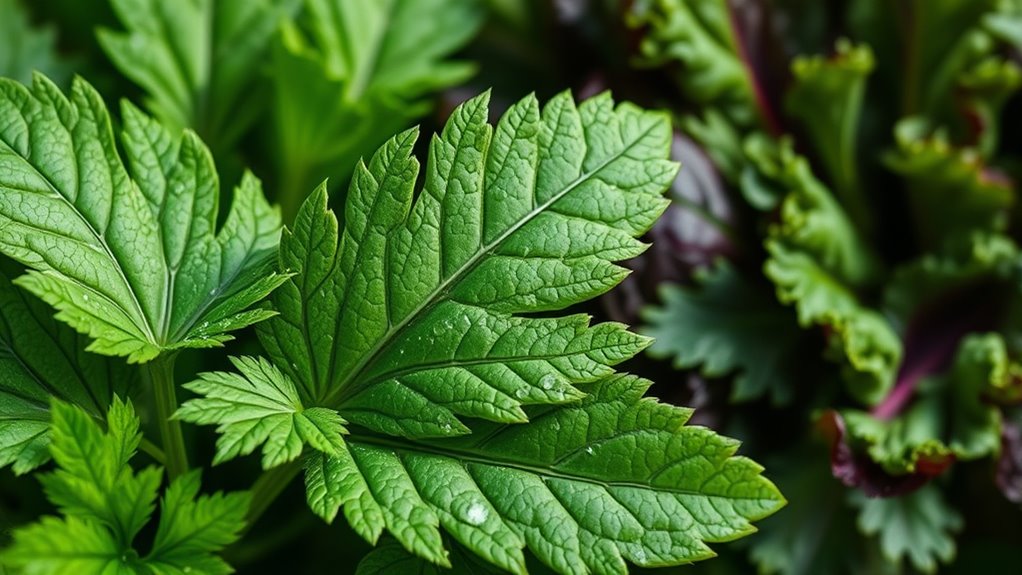
Compared to other leafy greens like spinach, kale, and Swiss chard, stinging nettle stands out for its exceptionally high nutrient density. Its comparative taste profiles are slightly earthy and more robust, adding depth to dishes. Nettle’s culinary versatility allows you to incorporate it into soups, teas, and smoothies, often replacing or complementing traditional greens. Its unique flavor enhances recipes without overpowering them. Unlike milder greens, nettle’s richness provides a nutrient punch in small amounts, making it a valuable addition. Its high concentration of vitamins, minerals, and antioxidants supports overall health. Vibrational energy plays a role in how effectively you can incorporate nettle into your wellness routine, aligning your intentions with your dietary choices. This versatility means you can experiment in your kitchen, boosting nutrient intake while enjoying diverse textures and flavors. Nettle’s distinctive qualities make it a compelling choice among leafy greens.
How Preparation Affects Nutritional Content
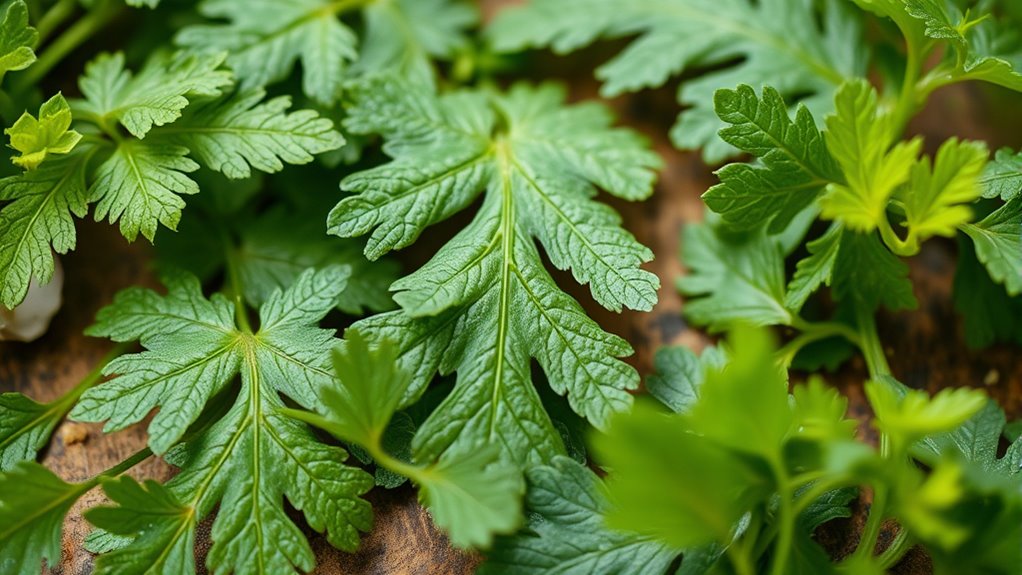
How you prepare stinging nettle substantially impacts its nutritional content. Different cooking methods, like boiling, steaming, or sautéing, can reduce certain nutrients, especially vitamin C and some minerals. Boiling nettles for longer periods may leach nutrients into the cooking water, so using quick steaming or blanching helps preserve more of their nutritional value. Preservation techniques also matter; drying nettles can concentrate flavors but may diminish heat-sensitive vitamins. Freezing nettles shortly after harvest retains much of their nutritional profile, making them a practical option for long-term use. Overall, gentle cooking and careful preservation techniques maximize nutrient retention, allowing you to enjoy the health benefits of stinging nettle while minimizing nutrient loss.
Frequently Asked Questions
Are There Any Potential Side Effects From Consuming Stinging Nettle?
You might experience allergic reactions like skin irritation or swelling if you’re sensitive to stinging nettle. It can also interact with medications such as blood thinners or diuretics, potentially causing complications. Always start with small amounts and consult your healthcare provider before adding it to your routine, especially if you’re pregnant, breastfeeding, or on medication. Being cautious helps prevent adverse side effects from consuming stinging nettle.
How Does Cooking Change the Nutrient Levels in Nettle?
You might think cooking preserves all nutrients, but it actually causes some nutrient degradation in nettles. Different cooking methods, like boiling or steaming, affect nutrient levels differently. Boiling can lead to significant loss of vitamins, especially vitamin C, while steaming preserves more nutrients. So, if you want to maximize nutrient retention, steaming is your best choice. Cooking definitely changes nutrient levels, so choose your method carefully to get the most benefits.
Can Nettle Be Safely Eaten Raw or Only Cooked?
You can safely eat nettle raw if you handle it carefully—wear gloves to avoid stings—and properly wash it. Raw consumption offers a fresh, grassy flavor and preserves some nutrients. However, cooking benefits include reducing stinging properties and boosting certain nutrient levels, making it easier and safer to enjoy. Both methods have their advantages, so choose based on your taste and comfort with handling the plant.
What Is the Shelf Life of Fresh Versus Dried Nettle?
Coincidentally, when considering storage duration, you’ll find fresh nettle lasts only a few days in the fridge, typically 2-3, if stored properly in an airtight container. Dried nettle, on the other hand, benefits from longer preservation methods like airtight jars or vacuum sealing, extending its shelf life to about a year. Proper storage techniques guarantee you maximize your nettle’s freshness and potency, whether fresh or dried.
Is There a Recommended Daily Intake of Nettle for Health Benefits?
You’re wondering about the daily intake and recommended dosage of nettle for health benefits. Generally, adults can safely consume about 300-500 mg of dried nettle extract daily, but it varies based on form and individual health. It’s best to start with a lower dose and consult a healthcare professional to determine what’s right for you. Following recommended guidelines guarantees you enjoy nettle’s benefits without potential side effects.
Conclusion
Just like the hero of a classic tale, stinging nettle offers hidden treasures beneath its prickly surface. Its rich mix of vitamins, minerals, and antioxidants can boost your health and energize your day. When you prepare it wisely, you access its full potential—much like opening a treasure chest. Embrace this humble plant, and you’ll discover a natural ally on your journey to wellness, proving that sometimes, the most powerful gifts come from nature’s quietest corners.

